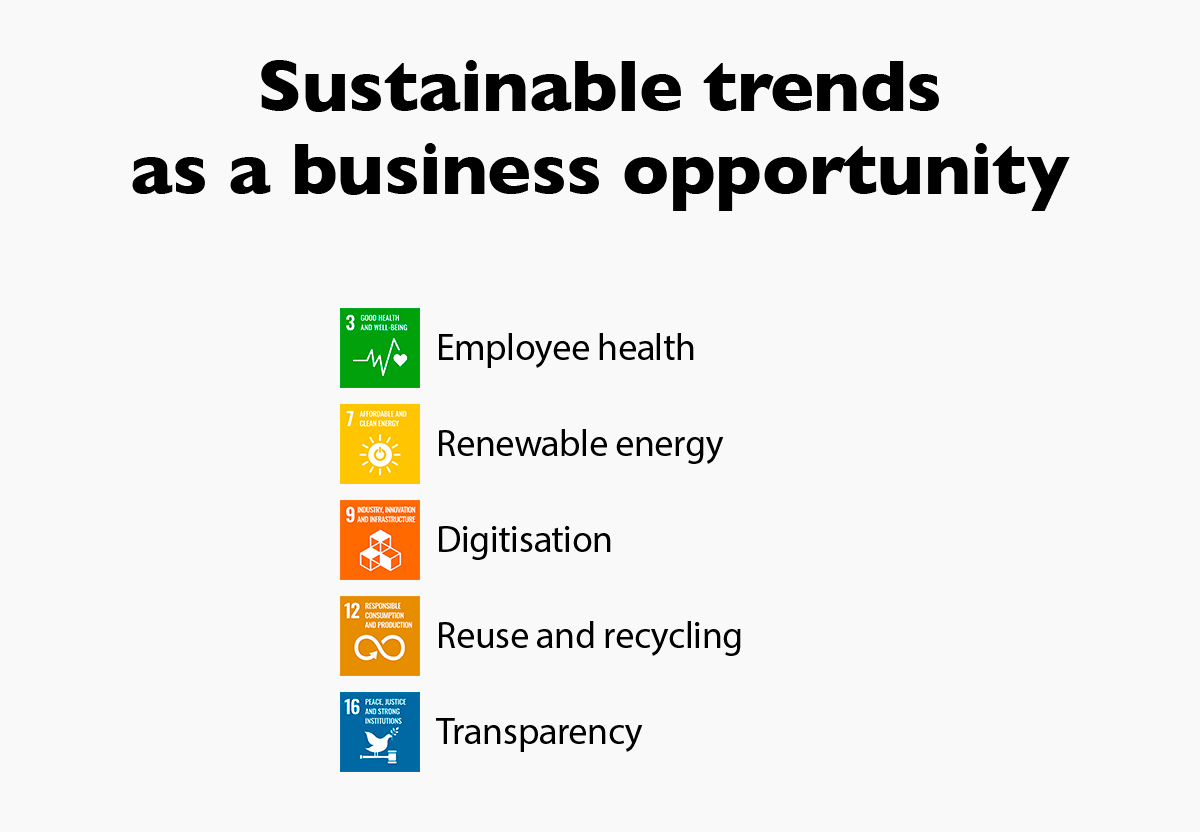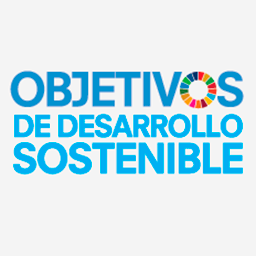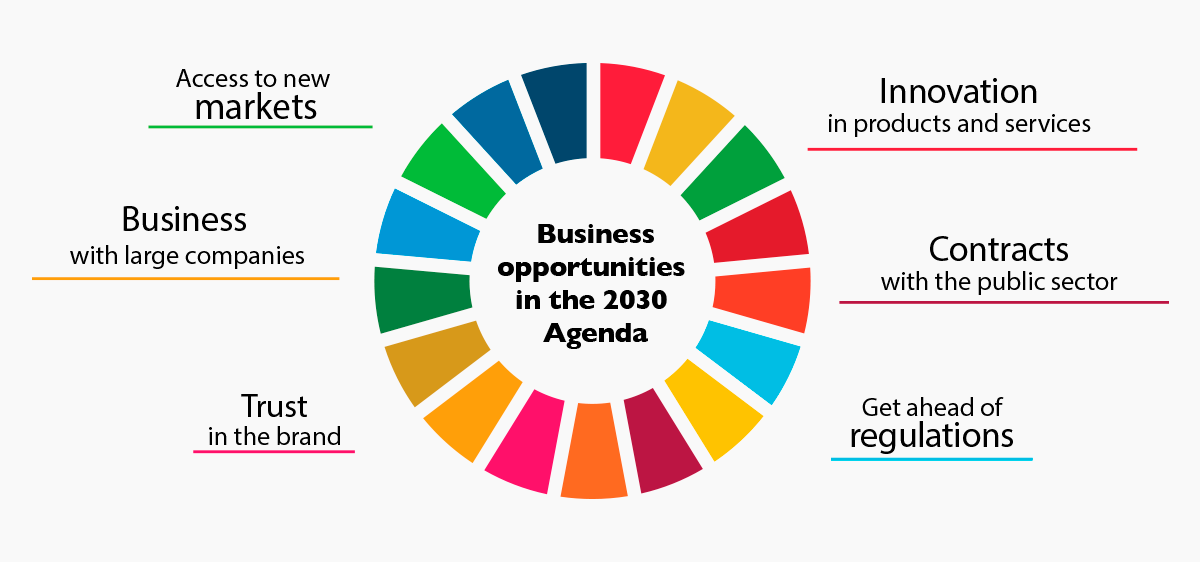Business opportunities
Take advantage of the important business opportunities that the 2030 agenda offers your SME
The 2030 agenda offers important business opportunities for your company. Start contributing to the SDGs’ achievement in order to access new markets and benefit from the following advantages:
Access to new markets
Contributing to the SDGs allows your SME to access new market segments that will be fundamental in the economy of the future, such as new technologies, the circular economy, inclusive business, renewable energies and the ecological economy.
Business with large companies
Large Spanish and foreign companies are investing more and more in sustainability and assess and demand compliance with this from their supplier companies. According to an analysis conducted by the Global Compact’s Spanish Network, 66% of the IBEX 35 companies already evaluate their suppliers according to social criteria, 71% evaluate environmental criteria and 80% are already contributing to the SDGs. SMEs that contribute to the 2030 agenda will therefore see increased opportunities to close agreements with large companies, and to maintain the business they already have with them.
Trust in the brand
Responsible consumption is an upward trend. 64% of Spanish consumers already take sustainability, that is to say the possible negative social or environmental impacts of the products and services they buy, into account in their purchases almost always or sometimes1. An SME with products and services aimed directly at the consumer can, through the 2030 agenda, increase trust in their brand and increase sales.
1 CETELEM observatory: https://elobservatoriocetelem.es/consumo/
Innovation in products and services
The 2030 agenda offers your company a chance to increase its customer base, promoting innovation in your products and services to make them environmentally and socially responsible and with the creation of new services aimed at new segments, such as the younger generations, for whom sustainability is linked to a brand’s reputation. 70% of young people under 35 years of age boycott non-responsible companies2 and 30% are consumers of organic products3.
2 Fundación Adecco, 2016. 4th report on the Spanish citizen and civil responsability available at http://fundacionadecco.org/blog/blog/los-ciudadanos-evaluan-a-las-empresas/
3 Ministry of Agriculture and Environment (MAGRAMA). 2016. Ecological agriculture. 2015 Statistics. Available at https://www.mapa.gob.es/es/alimentacion/temas/produccion-ecologica/estadisticaseco2015connipoymetadatos_tcm30-79293.pdf
Contracts with the public sector
Access to a greater number of grants or contracts with public administrations is another of the benefits that SMEs can find in the 2030 agenda. Law 9/2017, of 8 November, on public sector contracts includes environmental and social aspects as criteria for awarding public administration contracts to companies. These aspects include: measures to reduce the level of greenhouse gas emissions, energy-saving and efficiency measures, the implementation of a gender equality plan and the application of ethical and social responsibility criteria to the contractual provision.
Get ahead of regulations
In the coming years, there will be an increase in strategies and regulations on sustainability, which will translate into markets that increasingly consider companies’ environmental and social actions. In this sense, the future sustainable development strategy, the law on climate change and energy transition, the national business and human rights plan and the European Union’s new action plan on sustainable financing are just some examples of new policies that will mark the way forward.
The 2030 agenda is the only possible long-term growth model
Finally, we must not forget that the 2030 agenda aims to create a planet that is sustainable in the long term for future generations and, therefore, guarantees care for the environment, the economy and people. If we do not act urgently, problems such as climate change, respect for human rights and the depletion of natural resources may seriously deteriorate economic growth and, therefore, negatively impact the proper functioning of markets and companies. Without a sustainable planet, there will be no progress. Without progress there cannot be stable markets in which SMEs can safely operate.
There are many current trends related to the 2030 agenda in which your SME can invest and that may also represent important business opportunities. Some of the most relevant are:

- Employee health. Implementing measures that affect employees’ health and well-being can increase their motivation and commitment to the organisation and, therefore, their productivity. Work-life balance and flexibility measures, nutrition or physical activity programmes, and reducing the risk of occupational accidents are just some of the measures that your SME can implement.
- Renewable energy. By 2030, the European Union aims to ensure that 32% of the energy consumed in the Union will be of renewable origin4. Your SME can start to consume a higher percentage of renewable energy in its activities, generating a sustainable brand image. It can also innovate with new products and services that use or help promote the use of renewable energy, to adapt to the future of the market.
- Digitisation. The Internet and social networks are key in the markets’ future. 63% of Spaniards made online purchases from their mobile in 20185. In addition, in the digital age consumers are guided by the opinions of other users; 67% of Spanish consumers base their purchases on recommendations of other users on social networks6. Your SME has to take advantage of this trend to launch into the digital world and make the most of this new way of doing business.
- Reuse and recycling. The reuse and recycling of resources and products is a growing trend. In Spain, 77.1% of plastic, cans, cartons, paper and cardboard are currently recycled7. Your SME can promote the reuse and recycling of materials such as paper, plastics or packaging internally to save resources and can also create products and services based on reused and recycled materials that satisfy consumers looking for more sustainable products.
- Transparency. The value of disclosure of sustainability information by companies is increasingly recognised; transparency is fast becoming a new paradigm for doing business. Of the 250 largest companies in the world, over 90% of them report on their sustainability performance8 and the United Nations Global Compact has gone from 44 committed companies in 2000 to over 9,900 in 145 countries. This initiative requires member companies to prepare an annual progress report or sustainability report in which they discuss their progress in implementing the Global Compact’s 10 principles and their contributions towards the sustainable development goals.
4 http://europa.eu/rapid/press-release_STATEMENT-18-4155_en.htm
5 https://elobservatoriocetelem.es/wp-content/uploads/Informes/observatorio-cetelem-ecommerce-2018.pdf
6 CETELEM observatory: https://elobservatoriocetelem.es/consumo/
7 https://www.ecoembes.com/es/ciudadanos/envases-y-proceso-reciclaje/papel-envases-sociedad
8 KPMG. Current of changes, 2015. https://home.kpmg/content/dam/kpmg/pdf/2015/12/KPMG-survey-of-CR-reporting-2015.pdf

ICO can help you finance your projects. Check out our financing facilities.

Global Compact can help you with resources, tools and inspiration to advance sustainability. Get informed.

Select the objectives to learn more:

